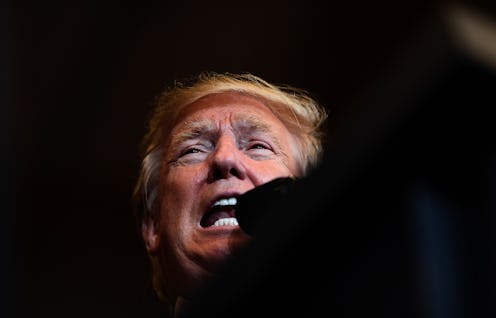News
The NYTimes Reviews Hitler Bio, Glancing At Trump
Michiko Kakutani — her name strikes excitement and fear into the hearts of most writers. The Pulitzer-Prize-winning chief book critic of The New York Times might be the most influential literature reviewer in the country, but she also knows how to use her reviews to make a larger point about art, culture, or the world. Which is why, in her review of Volker Ullrich’s Hitler: Ascent, 1889-1939, it becomes clear pretty quickly that Kakutani’s subject isn’t Hitler — she’s talking about Donald Trump.
Perhaps the fact that she never uses Trump’s name in the piece is what makes her indictment so chilling. Kakutani opens her review with a set of mournful questions which contain an embedded warning, like a time-traveler from a post-apocalyptic future come back to the present to warn us: “How did this ‘most unlikely pretender to high state office’ achieve absolute power in a once democratic country and set it on a course of monstrous horror?”
Parallels to Trump are everywhere in this piece. While it’s possible that it’s just my indelible liberal bias which allows me to so easily swap the GOP presidential nominee’s name with that of the German dictator, the similarities highlighted by Kakutani are impossible to ignore.
Breaking down Ullrich’s observations into a series of eerily familiar-sounding bullet points, Kakutani draws connections to Trump in a manner that is simultaneously subtle and completely impossible to ignore. “Hitler was often described as an egomaniac who ‘only loved himself,’" she writes, “a narcissist with a taste for self-dramatization and what Mr. Ullrich calls a ‘characteristic fondness for superlatives.’”
It raises the question: How do you say yuge in German?
I feel obliged to point out that Kakutani isn’t just going for a slapdash comparison here. She’s trying to scare the crap out of us, and it works. The connections she’s making aren’t only the usual gambits about his demagoguery and rhetorical style, but much more specific links — the kind of thing that would keep you up at night.
“The unwillingness of Germany’s political parties to compromise had contributed to a perception of government dysfunction, Mr. Ullrich suggests, and the belief of Hitler supporters that the country needed ‘a man of iron’ who could shake things up,” Kakutani writes, before going on to echo one of Trump’s most disturbing lines. “‘Why not give the National Socialists a chance?’ a prominent banker said of the Nazis.”
Kakutani’s masterful curation of Ullrich’s history is brought to a terrifying crescendo near the end of her review, as she highlights how Hitler was perceived by his contemporaries: “Early on, revulsion at Hitler’s style and appearance, Mr. Ullrich writes, led some critics to underestimate the man and his popularity, while others dismissed him as a celebrity, a repellent but fascinating 'evening’s entertainment.'”
While perhaps not the most accessible form of political writing, nor a silver bullet of thought that would radically change the minds of Trump’s supporters, the force and cleverness of Kakutani’s rhetoric can't be ignored, placing this ominous quote from Ullrich’s book near the end of her review: “‘As far as Hitler’s long-term wishes were concerned,’ Mr. Ullrich observes, ‘his conservative coalition partners believed either that he was not serious or that they could exert a moderating influence on him. In any case, they were severely mistaken.’”
Without mentioning Trump, Kakutani makes her comparison crystal clear.
